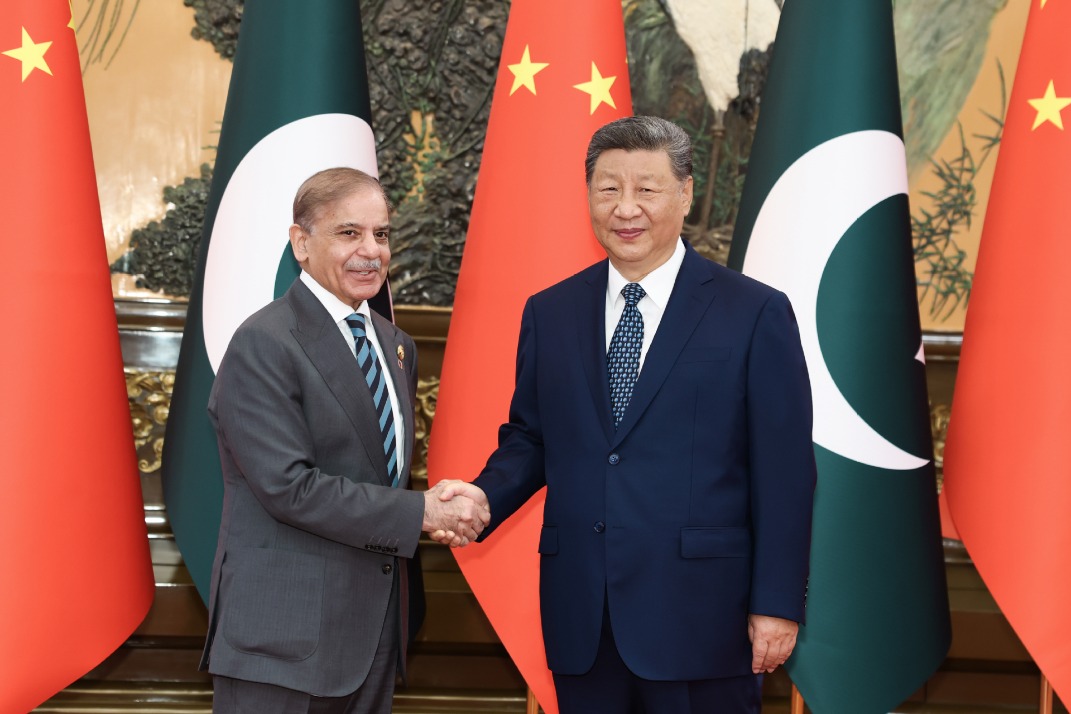Thaw bodes well for Sino-Japanese ties
High-level exchanges mark renewed commitment to collaboration: Experts
By CAI HONG | China Daily | Updated: 2025-01-15 09:18
There is a new warmth in Sino-Japanese relations, and experts believe a fresh chapter is unfolding.
During a meeting with senior officials from Japan's ruling Liberal Democratic Party and its coalition partner, Komeito, on Thursday, Japanese Prime Minister Ishiba Shigeru again expressed his strong desire to visit China at the earliest opportunity.
A delegation of LDP and Komeito officials is in China this week at the invitation of the Communist Party of China for the ninth meeting of the China-Japan ruling party exchange mechanism.
Analysts said the dialogue — the first since October 2018 — could lay the groundwork for Ishiba's anticipated visit.
The last Japanese prime minister to visit China was Abe Shinzo, whose trip took place in December 2019.
Japan's Kyodo News reported that Beijing and Tokyo are coordinating a possible visit by Foreign Minister Wang Yi to Tokyo in February. They are also preparing to hold a high-level bilateral economic dialogue during Wang's visit — the first in nearly six years — while exploring the possibility of organizing a trilateral meeting for the foreign ministers of China, Japan and South Korea.
Relations between Beijing and Tokyo began to thaw noticeably in the latter half of last year. A significant breakthrough came in November when President Xi Jinping and Ishiba held a crucial meeting on the sidelines of the APEC Economic Leaders' Meeting in Lima, Peru. It marked a recalibration of bilateral ties and set a positive tone for future engagements.
The momentum continued into December, with Japanese Foreign Minister Iwaya Takeshi visiting China — the first by a Japanese foreign minister in 20 months.
In a further sign of rapprochement, China reinstated its unilateral visa-free policy for Japanese citizens in November. Japan reciprocated by easing visa restrictions for Chinese travelers, including the introduction of 10-year multiple-entry tourist visas. The moves seek to foster deeper people-to-people connections.
Economic links
Wu Jinan, a senior researcher at the Shanghai Institutes for International Studies, said Ishiba stands out as one of the few Japanese politicians willing to actively engage with and understand China.
"Known for his familiarity with China's positions, Ishiba has earned the reputation of being a 'pro-China' figure in Japanese politics," he said.
Ishiba's political priorities have long centered on improving livelihoods and revitalizing local economies. With local governments across Japan eager to attract Chinese tourists and secure investments from Chinese companies, Wu suggested that Ishiba is likely to emphasize stronger ties with China as a means of advancing his commitment to economic revitalization at the local level.
'Equal footing'
"Ishiba has limited connections with the United States and has consistently advocated for 'equal footing' in Japan-US relations," Wu said. Ishiba has voiced reservations over the strong pro-US stance of his predecessor, Kishida Fumio, and has championed a more independent diplomatic approach, he added.
"Some observers in the US have even dubbed him Japan's Charles de Gaulle," Wu said, referring to the former French president known for his assertive and autonomous foreign policy.
This perspective aligns with a broader reevaluation of Japan's foreign policy by a growing number of Japanese politicians and scholars, many of whom are advocating a shift away from overreliance on the US.
However, Wu cautioned that Japan's China policy is marked by historical inertia, thus making significant changes a gradual process.
"For instance, during its final years, the Kishida administration deviated markedly from the right path for Sino-Japanese relations," he said. "It labeled China an 'unprecedented and greatest strategic challenge', promoted the notion that 'a Taiwan contingency is a Japan contingency', and substantially expanded military capabilities aimed at deterring China. These negative factors still linger today."
Strategic distancing
With Donald Trump's return to the US presidency, Japan may find itself under renewed pressure, in a replay of his first term. Analysts said this could prompt Tokyo to reassess its alignment with Washington, potentially creating an opportunity for Japan to somewhat distance itself strategically from the US.
"Regardless of how these dynamics evolve, China remains steadfast in its commitment to foster constructive and positive interactions between China, Japan and the US," Wu said. "The overarching goal is to avoid a resurgence of bloc confrontation and the zero-sum thinking that defined the Cold War era."
Liu Qingbin, a former professor at the Institute of Advanced Sciences at Yokohama National University in Japan, said, "Policy adjustments under the Ishiba administration are not just a short-term necessity but also a pragmatic and realistic approach for the long term."
While acknowledging the relative weakness of Ishiba's government and the uncertainties surrounding Japan's future policy direction, Liu said China remains open to any positive initiatives from Japan aimed at fostering stronger ties.
Liu Jiangyong, a professor of international relations at Tsinghua University, underscored the significance of this year's milestones — the 80th anniversaries of the victory in the World Anti-Fascist War and the founding of the United Nations, as well as the 70th anniversary of the Bandung Conference, which united Asian and African nations in their pursuit of independence and cooperation.
"China and Japan must join hands with member states of the Association of Southeast Asian Nations to reaffirm their commitment to peaceful multilateralism and open regionalism, and oppose violent multilateralism and closed-door trade protectionism," he said. "In so doing, the region can work collectively toward sustainable development and security."
caihong@chinadaily.com.cn
























